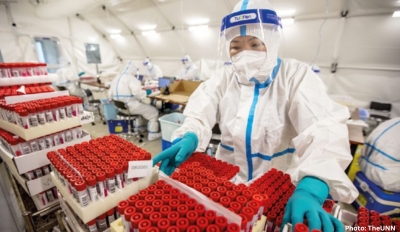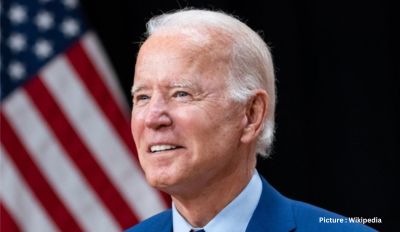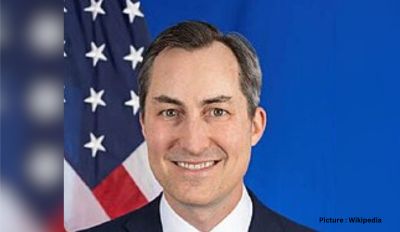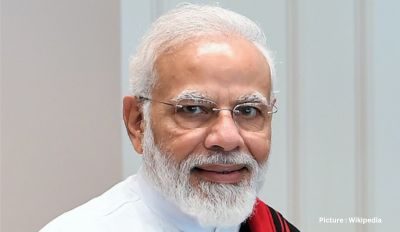Leaders of the world’s largest economies unveiled an infrastructure plan Saturday for the developing world to compete with China’s global initiatives, but there was no immediate consensus on how forcefully to call out Beijing over human rights abuses. Citing China for its forced labor practices is part of President Joe Biden’s campaign to persuade fellow democratic leaders to present a more unified front to compete economically with Beijing. But while they agreed to work toward competing against China, there was less unity on how adversarial a public position the group should take.
Canada, the United Kingdom and France largely endorsed Biden’s position, while Germany, Italy and the European Union showed more hesitancy during Saturday’s first session of the Group of Seven summit, according to a senior Biden administration official. The official who briefed reporters was not authorized to publicly discuss the private meeting and spoke on condition of anonymity. In his first summit as president, Biden made a point of carving out one-on-one-time with the leaders, bouncing from French president Emmanuel Macron to German chancellor Angela Merkel to Italian prime minister Mario Draghi, a day after meeting with British Prime Minister Boris Johnson as if to personally try to ward off memories of the chaos that his predecessor would often bring to these gatherings.
 Macron told Biden that collaboration was needed on a range of issues and told the American president that “it’s great to have a U.S. president part of the club and very willing to cooperate.” Relations between the allies had become strained during the four years of Donald Trump’s presidency and his “America first” foreign policy.Merkel, for her part, downplayed differences on China and the Nord Stream 2 pipeline which would transport natural gas from Russia to Germany, bypassing Ukraine.“The atmosphere is very cooperative, it is characterized by mutual interest,” Merkel said. “There are very good, constructive and very vivid discussions in the sense that one wants to work together.”
Macron told Biden that collaboration was needed on a range of issues and told the American president that “it’s great to have a U.S. president part of the club and very willing to cooperate.” Relations between the allies had become strained during the four years of Donald Trump’s presidency and his “America first” foreign policy.Merkel, for her part, downplayed differences on China and the Nord Stream 2 pipeline which would transport natural gas from Russia to Germany, bypassing Ukraine.“The atmosphere is very cooperative, it is characterized by mutual interest,” Merkel said. “There are very good, constructive and very vivid discussions in the sense that one wants to work together.”
Competing with Belt and Road
White House officials have said Biden wants the leaders of the G-7 nations — the U.S., Britain, Canada, France, Germany, Japan and Italy — to speak in a single voice against forced labor practices targeting China’s Uyghur Muslims and other ethnic minorities. Biden hopes the denunciation will be part of a joint statement to be released Sunday when the summit ends, but some European allies are reluctant to split so forcefully with Beijing.
China had become one of the more compelling sublots of the wealthy nations’ summit, their first since 2019. Last year’s gathering was canceled because of COVID-19, and recovery from the pandemic is dominating this year’s discussions, with leaders expected to commit to sharing at least 1 billion vaccine shots with struggling countries. The allies also took the first steps in presenting an infrastructure proposal called “Build Back Better for the World,” a name echoing Biden’s campaign slogan. The plan calls for spending hundreds of billions of dollars in collaboration with the private sector while adhering to climate standards and labor practices.
It’s designed to compete with China’s trillion-dollar “Belt and Road Initiative,” which has launched a network of projects and maritime lanes that snake around large portions of the world, primarily Asia and Africa. Critics say China’s projects often create massive debt and expose nations to undue influence by Beijing.Britain also wants the world’s democracies to become less reliant on the Asian economic giant. The U.K. government said Saturday’s discussions would tackle “how we can shape the global system to deliver for our people in support of our values,” including by diversifying supply chains that currently heavily depend on China.
Not every European power has viewed China in as harsh a light as Biden, who has painted the rivalry with China as the defining competition for the 21st century. But there are some signs that Europe is willing to impose greater scrutiny.Before Biden took office in January, the European Commission announced it had come to terms with Beijing on a deal meant to provide Europe and China with greater access to each other’s markets. The Biden administration had hoped to have consultations on the pact.
But the deal has been put on hold, and the European Union in March announced sanctions targeting four Chinese officials involved with human rights abuses in Xinjiang. Beijing responded with penalties on several members of the European Parliament and other Europeans critical of the Chinese Communist Party. Biden administration officials see an opportunity to take concrete action to speak out against China’s reliance on forced labor as an “affront to human dignity.”
While calling out China in the G-7 communique would not create any immediate penalties for Beijing, one senior administration official said the action would send a message that the leaders were serious about defending human rights and working together to eradicate the use of forced labor. An estimated 1 million people or more — most of them Uyghurs — have been confined in reeducation camps in China’s western Xinjiang region in recent years, according to researchers. Chinese authorities have been accused of imposing forced labor, systematic forced birth control, torture and separating children from incarcerated parents.Beijing rejects allegations that it is committing crimes.
Johnson, the summit host, also welcomed the leaders from “guest nations” South Korea, Australia and South Africa, as well as the head of the United Nations, to the summit to “intensify cooperation between the world’s democratic and technologically advanced nations.” India was also invited but its delegation is not attending in person because of the severe coronavirus outbreak in the country.
Hundreds of environmental protesters took to the Cornish seaside early Saturday in a bid to draw the attention to climate issues. A crowd of surfers, kayakers and swimmers gathered on a beach in Falmouth for a mass “paddle out protest” organized by Surfers Against Sewage, a group campaigning for more ocean protections. The leaders took steps to transition away from the use of coal, committing to spend $2 billion to help developing nations move off the fuel by funding job training and technology improvements. Japan had expressed reluctance to slow the construction of new coal fired plants. China remains a big funder of the technology.
Biden ends the trip Wednesday by meeting in Geneva with Russia’s Vladimir Putin. The White House announced Saturday that they will not hold a joint news conference afterward, which removes the opportunity for comparisons to the availability that followed Trump and Putin’s 2018 Helsinki summit, in which Trump sided with Moscow over his own intelligence agencies. Only Biden will address the news media after the meeting. Putin, in an interview with NBC News, said the U.S.-Russia relationship had “deteriorated to its lowest point in recent years.”He added that while Trump was a “talented” and “colorful” person, Biden was a “career man” in politics, which has “some advantages, some disadvantages, but there will not be any impulse-based movements” by the U.S. president.(AP)
At the end of the Summit, leaders made the following statement — Our shared agenda for global action to build back better:
“We, the leaders of the Group of Seven, met in Cornwall on 11-13 June 2021 determined to beat COVID-19 and build back better. We remembered everyone who has been lost to the pandemic and paid tribute to those still striving to overcome it. Inspired by their example of collaboration and determination, we gathered united by the principle that brought us together originally, that shared beliefs and shared responsibilities are the bedrock of leadership and prosperity. Guided by this, our enduring ideals as free open societies and democracies, and by our commitment to multilateralism, we have agreed a shared G7 agenda for global action to:
End the pandemic and prepare for the future by driving an intensified international effort, starting immediately, to vaccinate the world by getting as many safe vaccines to as many people as possible as fast as possible. Total G7 commitments since the start of the pandemic provide for a total of over two billion vaccine doses, with the commitments since we last met in February 2021, including here in Carbis Bay, providing for one billion doses over the next year. At the same time we will create the appropriate frameworks to strengthen our collective defences against threats to global health by: increasing and coordinating on global manufacturing capacity on all continents; improving early warning systems; and support science in a mission to shorten the cycle for the development of safe and effective vaccines, treatments and tests from 300 to 100 days.
Reinvigorate our economies by advancing recovery plans that build on the $12 trillion of support we have put in place during the pandemic. We will continue to support our economies for as long as is necessary, shifting the focus of our support from crisis response to promoting growth into the future, with plans that create jobs, invest in infrastructure, drive innovation, support people, and level up so that no place or person, irrespective of age, ethnicity or gender is left behind. This has not been the case with past global crises, and we are determined that this time it will be different.
Secure our future prosperity by championing freer, fairer trade within a reformed trading system, a more resilient global economy, and a fairer global tax system that reverses the race to the bottom. We will collaborate to ensure future frontiers of the global economy and society, from cyber space to outer space, increase the prosperity and wellbeing of all people while upholding our values as open societies. We are convinced of the potential of technological transformation for the common good in accordance with our shared values.
Protect our planet by supporting a green revolution that creates jobs, cuts emissions and seeks to limit the rise in global temperatures to 1.5 degrees. We commit to net zero no later than 2050, halving our collective emissions over the two decades to 2030, increasing and improving climate finance to 2025; and to conserve or protect at least 30 percent of our land and oceans by 2030. We acknowledge our duty to safeguard the planet for future generations.
Strengthen our partnerships with others around the world. We will develop a new partnership to build back better for the world, through a step change in our approach to investment for infrastructure, including through an initiative for clean and green growth. We are resolved to deepen our current partnership to a new deal with Africa, including by magnifying support from the International Monetary Fund for countries most in need to support our aim to reach a total global ambition of $100 billion.
Embrace our values as an enduring foundation for success in an ever changing world. We will harness the power of democracy, freedom, equality, the rule of law and respect for human rights to answer the biggest questions and overcome the greatest challenges. We will do this in a way that values the individual and promotes equality, especially gender equality, including by supporting a target to get 40 million more girls into education and with at least $2¾ billion for the Global Partnership for Education.
We shall seek to advance this open agenda in collaboration with other countries and within the multilateral rules-based system. In particular, we look forward to working alongside our G20 partners and with all relevant International Organisations to secure a cleaner, greener, freer, fairer and safer future for our people and planet.”









